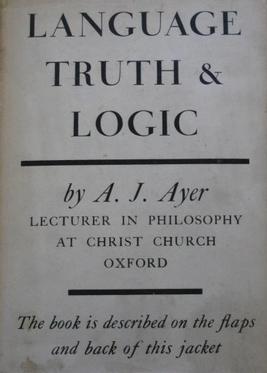
Aesthetics is the branch of philosophy concerned with the nature of beauty and the nature of taste; and functions as the philosophy of art. Aesthetics examines the philosophy of aesthetic value, which is determined by critical judgements of artistic taste; thus, the function of aesthetics is the "critical reflection on art, culture and nature".
First-order logic—also known as predicate logic, quantificational logic, and first-order predicate calculus—is a collection of formal systems used in mathematics, philosophy, linguistics, and computer science. First-order logic uses quantified variables over non-logical objects, and allows the use of sentences that contain variables, so that rather than propositions such as "Socrates is a man", one can have expressions in the form "there exists x such that x is Socrates and x is a man", where "there exists" is a quantifier, while x is a variable. This distinguishes it from propositional logic, which does not use quantifiers or relations; in this sense, propositional logic is the foundation of first-order logic.

Semantics is the study of reference, meaning, or truth. The term can be used to refer to subfields of several distinct disciplines, including philosophy, linguistics and computer science.
In linguistics and philosophy, a vague predicate is one which gives rise to borderline cases. For example, the English adjective "tall" is vague since it is not clearly true or false for someone of middling height. By contrast, the word "prime" is not vague since every number is definitively either prime or not. Vagueness is commonly diagnosed by a predicate's ability to give rise to the Sorites paradox. Vagueness is separate from ambiguity, in which an expression has multiple denotations. For instance the word "bank" is ambiguous since it can refer either to a river bank or to a financial institution, but there are no borderline cases between both interpretations.
The philosophy of mathematics is the branch of philosophy that studies the assumptions, foundations, and implications of mathematics. It aims to understand the nature and methods of mathematics, and find out the place of mathematics in people's lives. The logical and structural nature of mathematics makes this branch of philosophy broad and unique.

Rudolf Carnap was a German-language philosopher who was active in Europe before 1935 and in the United States thereafter. He was a major member of the Vienna Circle and an advocate of logical positivism. He is considered "one of the giants among twentieth-century philosophers."

The history of logic deals with the study of the development of the science of valid inference (logic). Formal logics developed in ancient times in India, China, and Greece. Greek methods, particularly Aristotelian logic as found in the Organon, found wide application and acceptance in Western science and mathematics for millennia. The Stoics, especially Chrysippus, began the development of predicate logic.
Metalogic is the study of the metatheory of logic. Whereas logic studies how logical systems can be used to construct valid and sound arguments, metalogic studies the properties of logical systems. Logic concerns the truths that may be derived using a logical system; metalogic concerns the truths that may be derived about the languages and systems that are used to express truths.

Neuroesthetics is a relatively recent sub-discipline of applied aesthetics. Empirical aesthetics takes a scientific approach to the study of aesthetic experience of art, music, or any object that can give rise to aesthetic judgments. Neuroesthetics is a term coined by Semir Zeki in 1999 and received its formal definition in 2002 as the scientific study of the neural bases for the contemplation and creation of a work of art. Neuroesthetics uses neuroscience to explain and understand the aesthetic experiences at the neurological level. The topic attracts scholars from many disciplines including neuroscientists, art historians, artists, art therapists and psychologists.

Dharmakīrti, was an influential Indian Buddhist philosopher who worked at Nālandā. He was one of the key scholars of epistemology (pramāṇa) in Buddhist philosophy, and is associated with the Yogācāra and Sautrāntika schools. He was also one of the primary theorists of Buddhist atomism. His works influenced the scholars of Mīmāṃsā, Nyaya and Shaivism schools of Hindu philosophy as well as scholars of Jainism.
The term conceptual model refers to any model that is formed after a conceptualization or generalization process. Conceptual models are often abstractions of things in the real world, whether physical or social. Semantic studies are relevant to various stages of concept formation. Semantics is fundamentally a study of concepts, the meaning that thinking beings give to various elements of their experience.
The SEQUAL framework is systems modelling reference model for evaluating the quality of models. The SEQUAL framework, which stands for "semiotic quality framework" is developed by John Krogstie and others since the 1990s.

Scientific modelling is an activity that produces models representing empirical objects, phenomena, and physical processes, to make a particular part or feature of the world easier to understand, define, quantify, visualize, or simulate. It requires selecting and identifying relevant aspects of a situation in the real world and then developing a model to replicate a system with those features. Different types of models may be used for different purposes, such as conceptual models to better understand, operational models to operationalize, mathematical models to quantify, computational models to simulate, and graphical models to visualize the subject.

Language, Truth and Logic is a 1936 book about meaning by the philosopher Alfred Jules Ayer, in which the author defines, explains, and argues for the verification principle of logical positivism, sometimes referred to as the criterion of significance or criterion of meaning. Ayer explains how the principle of verifiability may be applied to the problems of philosophy. Language, Truth and Logic brought some of the ideas of the Vienna Circle and the logical empiricists to the attention of the English-speaking world.
In logic, the formal languages used to create expressions consist of symbols, which can be broadly divided into constants and variables. The constants of a language can further be divided into logical symbols and non-logical symbols.
Interpretation may refer to:
An interpretation is an assignment of meaning to the symbols of a formal language. Many formal languages used in mathematics, logic, and theoretical computer science are defined in solely syntactic terms, and as such do not have any meaning until they are given some interpretation. The general study of interpretations of formal languages is called formal semantics.
According to Rudolf Carnap, in logic, an interpretation is a descriptive interpretation if at least one of the undefined symbols of its formal system becomes, in the interpretation, a descriptive sign. In his Introduction to Semantics he makes a distinction between formal interpretations which are logical interpretations and descriptive interpretations: a formal interpretation is a descriptive interpretation if it is not a logical interpretation.
Philosophy of logic is the area of philosophy that studies the scope and nature of logic. It investigates the philosophical problems raised by logic, such as the presuppositions often implicitly at work in theories of logic and in their application. This involves questions about how logic is to be defined and how different logical systems are connected to each other. It includes the study of the nature of the fundamental concepts used by logic and the relation of logic to other disciplines. According to a common characterization, philosophical logic is the part of the philosophy of logic that studies the application of logical methods to philosophical problems, often in the form of extended logical systems like modal logic. But other theorists draw the distinction between the philosophy of logic and philosophical logic differently or not at all. Metalogic is closely related to the philosophy of logic as the discipline investigating the properties of formal logical systems, like consistency and completeness.

Anil K. Gupta is an Indian-American philosopher who works primarily in logic, epistemology, philosophy of language, and metaphysics. Gupta is the Alan Ross Anderson Distinguished Professor of Philosophy at the University of Pittsburgh. He is also a Fellow of the American Academy of Arts and Sciences. His most recent book, Conscious Experience: A Logical Inquiry, was published by Harvard University Press in 2019.







